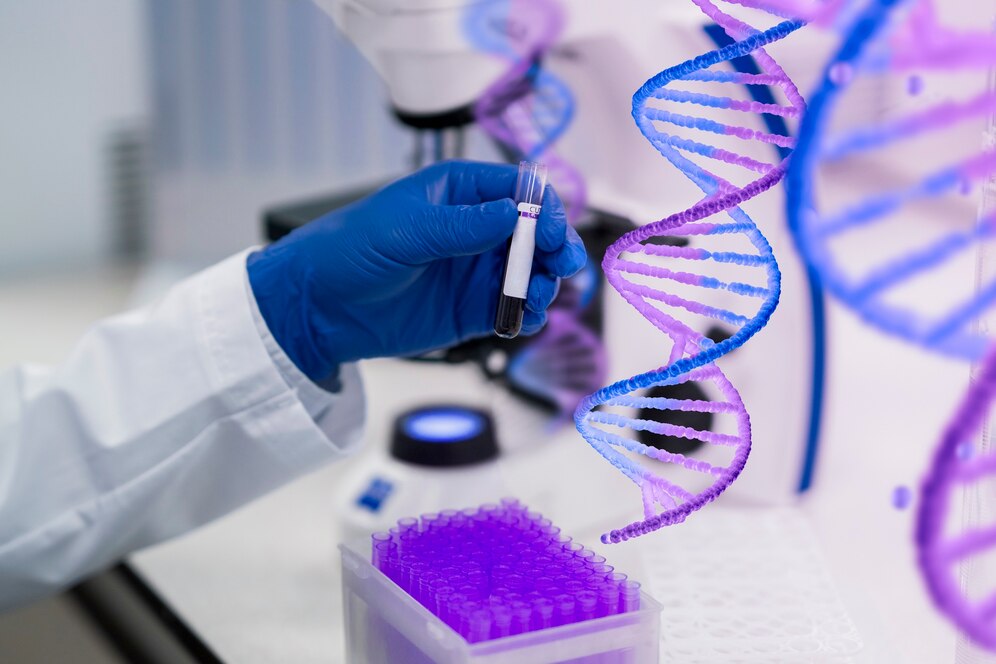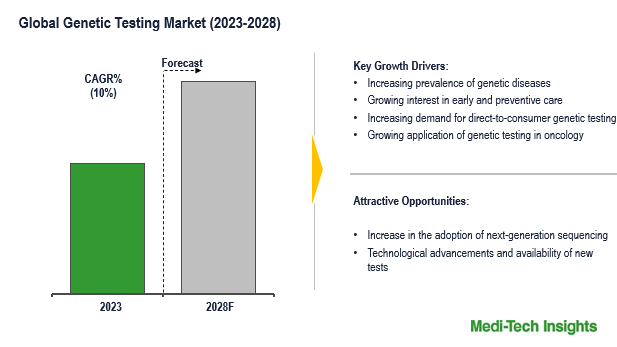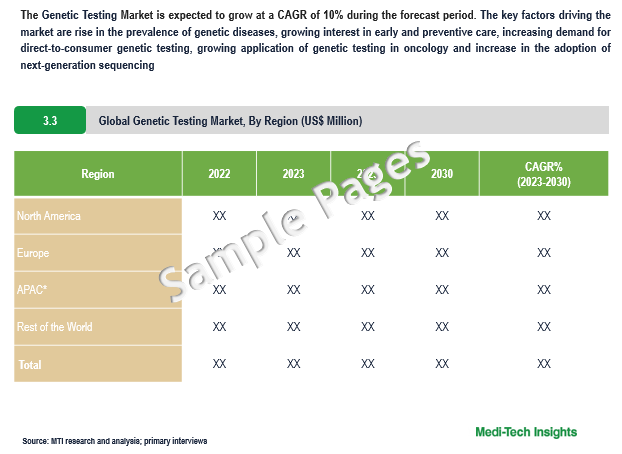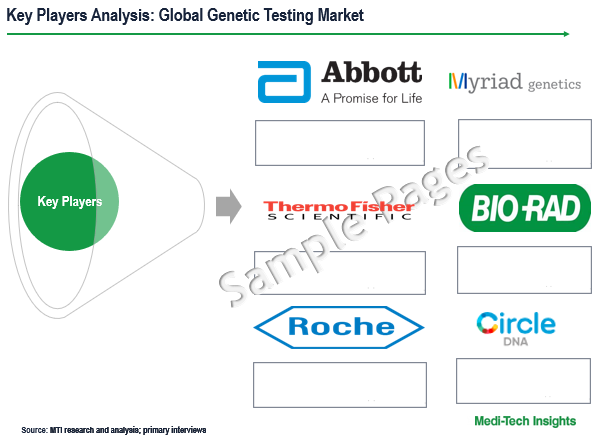
Genetic Testing Market Size, Share, Industry Growth and Forecast to 2028

The Genetic Testing Market is projected to grow at a CAGR of 10% during the forecast period. The market is propelled by factors such as rise in the prevalence of genetic diseases, growing interest in early and preventive care, increasing demand for direct-to-consumer genetic testing, and growing application of genetic testing in oncology. To learn more about the research report, fill out a quick inquiry for a sample report.
Genetic testing is a medical examination used for detecting gene, chromosome, or protein alterations. Results can affirm or negate suspected genetic conditions, aiding in assessing the risk of developing or transmitting genetic disorders. There are different types of genetic testing:
- Diagnostic Testing: Identifies genetic disorders in symptomatic individuals, such as confirming diagnoses for conditions like Cystic Fibrosis or Huntington's disease
- Presymptomatic and Predictive Testing: Proactively assesses genetic susceptibility based on family history, particularly valuable for evaluating the risk of specific colorectal cancers
- Carrier Testing: Prudent genetic testing before family planning, especially for those with a family history or high-risk ethnic backgrounds. Identifies potential genetic diseases and assesses both partners' carrier status
- Pharmacogenetics: Tailors medication and dosage for optimal effectiveness based on genetic testing, particularly beneficial for individuals with specific health conditions
- Prenatal Testing: Detects gene abnormalities during pregnancy, including Down Syndrome and Trisomy 18, using traditional methods like blood markers or modern cell-free DNA testing
- Newborn Testing: Mandatory genetic testing for newborns. It helps in identifying conditions like congenital hypothyroidism, sickle cell disease, or phenylketonuria (PKU) for immediate care initiation
- Preimplantation Testing: Utilized in in-vitro fertilization (IVF), preimplantation genetic diagnosis (PGD) screens embryos for abnormalities, enhancing the success rate of pregnancy by selecting healthy embryos for implantation
Genetic Testing’s Crucial Role in Disease Identification Drives Market Growth
Genetic testing, including prenatal and newborn screening, plays a crucial role in identifying diseases such as Thalassemia, Down's Syndrome, and Cystic Fibrosis. The increasing incidence of genetic diseases is expected to drive the demand for genetic tests globally. For instance, as per the data released by the United Nations on World Down Syndrome Day (March 21, 2022), annually approximately 3,000 to 5,000 children are born with Down Syndrome globally. According to the Cystic Fibrosis Foundation Patient Registry, in the United States, there are approximately 40,000 children and adults living with cystic fibrosis and about 1,000 new cases of cystic fibrosis are diagnosed each year. Additionally, the Indian Academy of Thalassemia in 2021 reported that around 15,000 children are born with Thalassemia in India, contributing to approximately 10% of global Thalassemia cases in children.
Growing Interest in Early and Preventive Care is Fueling Demand
The demand for early and preventive care is a pivotal factor propelling the growth of the genetic testing market in the United States. Escalating economic burdens associated with disease treatment have prompted healthcare providers and regulatory bodies to prioritize early diagnosis and health risk screening. Chronic diseases, notably cardiovascular conditions, contribute to an estimated annual cost of USD 320 billion in direct and indirect expenses within the U.S. healthcare system, as reported by the Centers for Disease Control and Prevention (CDC). Genetic testing plays an increasingly significant role in identifying and preventing serious medical issues before they escalate. Consequently, these tests have become integral to preventive care, with a majority of private healthcare payers incorporating them into reimbursement policies. The market is further fueled by the growing adoption of these testing procedures for rare genetic disorders, supported by increased coverage and favorable reimbursement policies for preventive genetic testing.

Fill out the "Quick Inquiry Form" to request a sample copy.
Genetic Testing Market - Competitive Landscape
Some of the key players operating in genetic testing market include Abbott Laboratories, Danaher Corporation, Thermos Fisher Scientific, Hoffmann-La Roche, Qiagen, Illumina, Myriad Genetics, Bio-Rad Laboratories, DiaSorin/Luminex Corporation, CircleDNA, tellmeGen, 23andMe, AncestryDNA, Mapmygenome, Color Health, MyHeritage, among others.
Organic and Inorganic Growth Strategies Adopted by Players to Establish Their Foothold in the Market
Players operating in this market are adopting organic and inorganic growth strategies such as launching new products and acquiring related firms to enhance their market position, expand their offerings, and broaden their customer base. For instance,
- In June 2022, Prenetics Group Limited, a prominent player in genomic and diagnostic testing, unveiled ColoClear by Circle (ColoClear), an innovative non-invasive at-home screening test designed to identify early indications of colorectal cancer
- In March 2022, Illumina, a pioneer in genome sequencing, introduced a Comprehensive Genomic Profiling Test for Cancer in Europe. The single test assesses multiple tumor genes and biomarkers and reveals the specific molecular profile of a patient's cancer
- In November 2022, Myriad Genetics, Inc., a frontrunner in genetic testing and precision medicine, declared its acquisition of Gateway Genomics, LLC. This strategic move involves the integration of Gateway Genomics, a leading personal genomics company known for developing consumer genetic tests, including the highly successful SneakPeek Early Gender DNA Test, into Myriad Genetics' portfolio
The Genetic Testing Market is expected to gain further momentum in the coming years due to the increase in the adoption of next-generation sequencing, rising disposable income, technological advancements and availability of new tests, and aggressive organic and inorganic growth strategies followed by the players.
Genetic Testing Market Scope
|
Report Metric |
Details |
|
Growth Rate |
CAGR of 10% from 2023 to 2028 |
|
Historical data |
2018-2023 |
|
Base year |
2023 |
|
Forecast period |
2023 to 2028 |
|
Types of Genetic Testing |
1. Diagnostic Testing 2. Presymptomatic and Predictive Testing 3. Carrier Testing 4. Pharmacogenetics 5. Prenatal Testing 6. Newborn Testing 7. Preimplantation Testing |
|
Genetic Testing Market - Key Companies |
Abbott Laboratories, Danaher Corporation, Thermos Fisher Scientific, Hoffmann-La Roche, Qiagen, Illumina, Myriad Genetics, Bio-Rad Laboratories, DiaSorin/Luminex Corporation, CircleDNA, tellmeGen, 23andMe, AncestryDNA, Mapmygenome, Color Health, MyHeritage |
|
By Product & Service |
Consumables, Equipment, Software & Services |
|
By Type |
Carrier Testing, Prenatal and Newborn Testing, Diagnostic Testing, Pharmacogenomic Testing, Predictive and Presymptomatic Testing, Others |
|
By Technique |
Cytogenetic Testing, Biochemical Testing, Molecular Testing |
Key Strategic Questions Addressed
- What is the market size and forecast for the Genetic Testing Market?
- What are the historical, present, and forecasted market shares and growth rates of various segments and sub-segments of the Genetic Testing Market?
- What are the major growth drivers, restraints/challenges impacting the market?
- What are the opportunities prevailing in the market?
- What is the investment landscape?
- Which region has the highest share in the market? Which region is expected to witness the highest growth rate in the next 5 years?
- Who are the major players operating in the market? What is the competitive positioning of key players?
- Who are the new players entering the market?
- What are the key strategies adopted by players?
- Research Methodology
- Secondary Research
- Primary Research
- Market Estimation
- Market Forecasting
- Executive Summary
- Market Overview
- Market Dynamics
- Drivers
- Restraints
- Opportunities
- Industry Speaks
- Market Dynamics
- Global Genetic Testing Market - Size & Forecast (2021 - 2028), By Product & Service
- Consumables
- Equipment
- Software & Services
- Global Genetic Testing Market - Size & Forecast (2021 - 2028), By Type
- Carrier Testing
- Prenatal and Newborn Testing
- Diagnostic Testing
- Pharmacogenomic Testing
- Predictive and Presymptomatic Testing
- Others
- Global Genetic Testing Market - Size & Forecast (2021 - 2028), By Technique
- Cytogenetic Testing
- Biochemical Testing
- Molecular Testing
- Global Genetic Testing Market - Size & Forecast (2021 - 2028), By Region
- North America (U.S. & Canada)
- Europe (UK, Germany, France, Italy, Spain, Rest of Europe)
- Asia Pacific (China, India, Japan, Rest of Asia Pacific)
- Rest of the World (Latin America, Middle East & Africa)
- Competitive Landscape
- Key Players and their Competitive Positioning
- Competitive Positioning of Key Players (2022)
- Offerings Assessment, By Players
- Key Strategies Assessment, By Player (2021-2023)
- New Product and Service Launches
- Partnerships, Agreements, & Collaborations
- Mergers & Acquisitions
- Other Developments
- Key Players and their Competitive Positioning
- Key Companies Scanned (Indicative List)
- Abbott Laboratories
- Danaher Corporation
- Thermos Fisher Scientific
- Hoffmann-La Roche
- Qiagen
- Illumina
- Myriad Genetics
- Bio-Rad Laboratories
- DiaSorin/Luminex Corporation
- CircleDNA
- tellmeGen
- 23andMe
- AncestryDNA
- Mapmygenome
- Color Health
- MyHeritage
- Other Players
Research Methodology
The study has been compiled by various primary and secondary research.
Secondary Research (Indicative List)

Primary Research
To validate research findings (market size & forecasts, market segmentation, market dynamics, competitive landscape, key industry trends, etc.), extensive primary interviews were conducted with both supply and demand-side stakeholders.
Supply Side Stakeholders:
- Senior Management Level: CEOs, Presidents, Vice-Presidents, Directors, Chief Technology Officers, Chief Commercial Officers
- Mid-Management Level: Product Managers, Sales Managers, Brand Managers, Business Development Managers, Consultants
Demand Side Stakeholders: Hospitals and Clinics, Diagnostic Laboratories and, among others

Market Size Estimation
Both ‘Top-Down and Bottom-Up Approaches’ were used to derive market size estimates and forecasts.
Data Triangulation
Research findings derived through secondary sources & and internal analysis were validated with Primary Interviews, Internal Knowledge Repository, and Company Sales Data.



